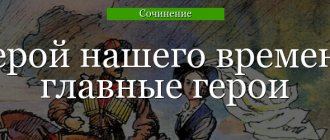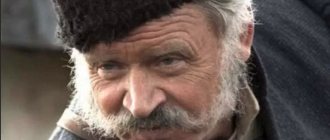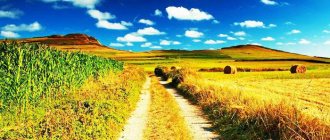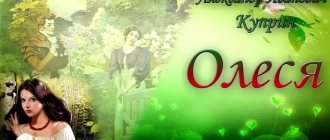Portrait of the Caucasus in the chapter “Bela”
In this chapter of the work, figuratively speaking, a glimpse of the picturesque region is given, for it is he, and not Pechorin, who is the main character here. Nature determines the character of the people living there, their relationships with each other and with their fellow tribesmen, as well as the dramatic, even tragic situation that formed the basis of the plot.
The reader sees the Caucasus through the eyes of two characters:
- a storyteller traveling through this region and depicting it in his travel notes;
- 50-year-old staff captain Maxim Maksimych, a veteran of the Caucasian War.
The narrator, finding himself for the first time in the part of the Caucasus in question, is amazed by the beauty and grandeur of the landscape. This is how he described the panorama of the Koishauri Valley that opened before his eyes: “On all sides there are inaccessible mountains, reddish rocks, hung with green ivy and crowned with clumps of plane trees, yellow cliffs, streaked with gullies, and there, high, high, a golden fringe of snow...”
The author deliberately placed the image of landscape sketches in a long complex sentence, and not in several short ones, in order to show that one object of admiration seems to run into another, one has only to turn, raise or tilt his head a little, and the viewer does not have time to pause, indicated on the letter with a dot.
Nature depicted by the narrator:
- majestic, it elevates a person (it seems to the narrator that the road leads straight to the sky, he is happy to feel high above the world);
- alive and spiritual, everything moves in it, everything changes (“round dances of stars” are woven into patterns, fogs swirl and twist, snow sparkles with a “ruddy shine” in the rays of the rising sun;
- cruel and treacherous (the river and the fogs sliding lower and lower are compared to snakes, the cloud is compared to a kite looking for prey, there is a “bloody streak” above the rising sun; movement along a narrow road is fraught with great danger).
In this description of nature one can feel the indifference of the author’s pen. Lermontov subtly senses the charm and primordial nature of the world around him.
Landscape function
Analysis of the work shows that the role of the panorama of the area where the hero was located is very multifaceted and limitless. From the first lines, the author creates a mysterious, unique atmosphere. The chapter “Taman” shows a dreamy image of the sea acting as a background.
It is safe to say that nature in the novel “A Hero of Our Time” is an auxiliary character that performs several functions at once, but is by no means secondary. What role do landscape sketches play in this work? There are several main functions:
- The landscape characterizes the scene of action and helps to recreate for the reader a three-dimensional idea of the situation surrounding the hero.
- Also, nature, as it were, anticipates some events, predicts them, and tries with its prophecy to protect Pechorin from fatal mistakes.
- The landscape conveys the hero’s state of mind and reveals the complexity of his nature.
The first indicated function of nature as an important element in the complex outline of the work is clearly manifested in the story “Bela”. Thus, the panorama that opens the narrative immerses the reader in the artistic world of the work. It allows you to completely immerse yourself in the atmosphere where the action takes place.
The narrator, who finds himself in the Koishauri Valley, describes in detail and with extraordinary accuracy the rocks “inaccessible, reddish, hung with green ivy and crowned with clumps of plane trees”, “cliffs streaked with gullies, and there is a high, high golden fringe of snow.”
It is worth noting that the description of this valley is similar to Pushkin’s perception of the region in his travel notes “Travel to Arzrum”. But a comparative description of the two works shows that there are serious differences:
Pushkin describes nature briefly, laconically, and does not pay special attention to it, although it also performs an important function.
- Lermontov draws the landscape in detail, conveys the details and features of the valley, interspersing philosophical reflections into the description.
Nature in Lermontov’s texts seems to come to life, filled with color, colors, and sounds. The poet is amazingly meticulous in his landscapes, trying not to miss anything and conveying the splendor of the Caucasus as fully and voluminously as possible.
Life of the Highlanders
The locals are accustomed to being surrounded by just such nature, and it influenced the formation of their national character. Their main occupation is cattle breeding and related crafts, as well as hunting, and the game for this people is not only the fauna of mountain forests, but also strangers, that is, Russians. They are caught to be turned into slaves or returned to their relatives for a ransom.
The mountaineers raid Cossack villages, from where they come with loot. Or they don’t return, because the Cossacks are also excellent warriors. Therefore, the mountaineers value courage and dexterity, and cowards and louts simply cannot survive in their midst.
Constant danger devalues their existence, which is why these people are equally ready to die and kill. The characteristics of the mountaineers show that honesty and deceit, loyalty and treachery coexist in a strange way. The Russians who came to their land (the same Maxim Maksimych) consider the indigenous inhabitants of the Caucasus to be savages, but this is not so. They simply have a different, incomprehensible and unacceptable culture for representatives of another civilization.
Pechorin did not take this into account when he got a local beauty to come to him, and the story told by Maxim Maksimych ended tragically. The point here is not so much in the eternal “loved and fell out of love”, but in the collision of two worlds, civilizations that will have to learn to understand each other for several centuries. And this process is not complete, as the events of recent history have shown.
Perhaps one of the steps towards such understanding is the narrator’s attempt to see something familiar and his own in an alien world, fascinating and at the same time frightening. Thus, the wind raging in the Caucasus mountains whistles like the most literal Russian Nightingale the Robber, and the snowdrifts in the Devil’s Valley resemble Saratov, Tambov and other corners of central Russia.
Even the snowstorm howls, just like in the north of the country.
Here the narrator, who had previously talked about anything but himself, seemed to let slip about who he was. Turning to the blizzard as an exile, one can assume that the hero is not in the Caucasus of his own free will .
In none of the subsequent chapters does nature play such an important role as in the chapter “Bela,” because the narrator changes: Pechorin becomes him. If we analyze this part of the work, we can understand that the narrator is interested in the Caucasus as such, and for the main character, the main theme is his own inner world, and this region is only the scene of action.
Landscape in Pechorin's diary
Lermontov generously shared his literary talent with the main character. Pechorin in his journal (diary) reveals himself as a magnificent storyteller, an intelligent, observant person, with a keen sense of beauty, including the beauty of nature. In his confessional notes she:
- The background against which events take place.
- Accompaniment to the feelings and moods of the hero.
- Reason for philosophical reflection.
In the chapter “Taman” Pechorin tells his story with the smugglers. This adventure almost cost him his life. The action takes place against the backdrop of a seascape reminiscent of a painting by I.K. Aivazovsky: a steep coast led to the sea, where dark blue waves splashed, the moon illuminated the restless but submissive element.
Although this work is realistic, when talking about smugglers, one cannot avoid a certain shade of romanticism associated with their craft. And you won’t find a more natural setting for this than a rough sea on a moonlit night.
Princess Mary
In this part of the work, many important, sometimes fateful events take place for Pechorin, and every time nature seems to accompany his state of mind. The beginning of the chapter is morning in Pyatigorsk. Rested after a tiring journey, Pechorin looks out the window and sees a lovely picture: he is surrounded by majestic mountains, which from a distance do not look menacing, but peaceful and picturesque.
“The air is clean and fresh, like a child’s kiss; the sun is bright, the sky is blue - what else seems to be more? “Why are there passions, desires, regrets?” - that’s what Pechorin said that morning. At this time, Pyatigorsk, whose mineral waters became famous for their healing properties, had already turned into a fashionable resort.
Pechorin is in a great mood, he quotes Pushkin, enjoys the purity of the mountain air. During the day, he meets his friend Grushnitsky, meets Dr. Werner, who turns out to be an interesting conversationalist, and draws attention to the pretty Princess Mary.
Every other day, the state of nature changes, now everything in it foreshadows a thunderstorm. Pechorin’s feeling of tension and anxiety coincides with the premonition of a meeting with Vera, the hero’s strongest attachment. But it was not joy that she brought to both, but the bitter realization that no matter how attracted they were to each other, they could not be together.
The moment when Pechorin tried to catch up with Vera, who had left with her husband, is emphasized by a gloomy picture of nature: “The sun was already hidden in a black cloud resting on the ridge of the western mountains; it became dark and damp in the gorge.” This meant the end.
Pechorin perceives the world around him especially emotionally before his duel with Grushnitsky: “I don’t remember a bluer and fresher morning! The sun barely appeared from behind the green peaks, and the merging of the warmth of its rays with the dying coolness of the night brought a kind of sweet languor to all the senses...” And when the hero, standing on the rock where the duel was supposed to take place, looked down, it seemed to him that it was “dark and cold, like in a coffin,” and the sharp stones seemed to anticipate prey.
“Princess Mary” ends with an imaginary landscape that appeared before Pechorin’s inner gaze: a seashore with an alluring shady grove and a peaceful sun and an open surface of water where the “desired sail” should appear, the same one from Lermontov’s poem that “asks for a storm” and in whose the hero makes a choice.
The role of landscape in the novel by M.Yu. Lermontov "Hero of Our Time"
Also in “Princess Mary,” Pechorin’s first meeting with Vera is preceded by a thunderous landscape saturated with electricity: “It was getting hot; white shaggy clouds quickly fled from the snowy mountains, promising a thunderstorm; Mashuk's head was smoking like an extinguished torch; Around him, gray wisps of clouds curled and crawled like snakes, detained in their quest and as if caught in the thorny bushes. The air was filled with electricity" [17;127]. The description of an approaching thunderstorm evokes excitement and a feeling of anxiety. This thunderstorm becomes a harbinger of life's storms.
And here is how the road along which Pechorin and Werner are going to a duel is described in the story “Princess Mary”: “... and we set off - instantly galloped past the fortress through the settlement and drove into a gorge along which a road wound, half overgrown with tall grass and crossed every minute a noisy stream through which it was necessary to ford, to the great despair of the doctor, because his horse stopped every time in the water” [17;200]. At first it is a wide path, illuminated by the weak rays of the morning sun, then the path narrows, the sun no longer penetrates through the trees. This picture of “the victory of darkness over light, as it were, foreshadows the gloomy outcome of the duel” [9;26], causes a feeling of anxiety.
Lermontov's landscape has a very important feature: it is closely connected with the experiences of the characters, expresses their feelings and moods, the entire novel is imbued with deep lyricism. This is where passionate emotionality is born, the excitement of descriptions of nature, creating a feeling of musicality in his prose: the silvery thread of rivers and the bluish fog sliding on the water, escaping into the gorges of the mountains from the warm rays, and the shine of snow on the mountain ridges. The precise and fresh colors of Lermontov’s prose help to understand the emotional mood of the characters. Connection with nature, love for it is evidence of a person’s spiritual wealth. The narrator from the story “Bela,” having climbed Mount Gud and admiring the view, notes: “In the hearts of simple people, the feeling of the beauty and grandeur of nature is stronger, a hundred times more vivid, than in us” [17;38]. In addition, the landscape is needed to motivate the hero’s experiences, as a factor that evokes in him various moods, desires, and thoughts. Therefore, the landscape is drawn in the refraction of the hero’s psyche, transferring his “I” into nature, seeking in it “calmness and cleansing from emptiness and vulgar life” [23;110]. This attitude towards nature causes the widespread use in the landscape of “techniques of animization (revival) and anthropomorphization (humanization), as well as an abundance of subjective evaluative epithets” [23; 113], exclamations and questions addressed to the depicted are not uncommon. This is the lyrical picture in “Bel” during the descent to the Kobi station: “... the blizzard hummed stronger and stronger, like our native, northern one; only her wild melodies were sadder, more mournful. “And you, exile,” I thought, “cry for your wide, free steppes! There is room to spread your cold wings, but here you are stuffy and cramped, like an eagle that screams and beats against the bars of its iron cage” [17:43]. The author’s address to the blizzard as a yearning exile yearning for freedom, similar to a prose poem, suggests that this officer, like Pechorin, and Lermontov himself, was a Caucasian against his will, “an exile from the dear north to the south,” and the image of an eagle became a symbol of homesickness.
§3. The role of landscape in revealing the image of Pechorin
An artistic description of nature is very important in revealing the image of Pechorin. In Pechorin's diary we often come across descriptions of nature associated with certain thoughts, feelings, moods, and this helps us penetrate his soul and understand many of his character traits.
At the beginning of “Princess Mary” we see beautiful views of the outskirts of Pyatigorsk, the description of which Pechorin ends with the following: “It’s fun to live in such a land! Some kind of gratifying feeling flowed through all my veins. The air is clean and fresh, like a child's kiss; the sun is bright, the sky is blue - what would seem to be more? Why are there passions, desires, regrets?..” [17;100] A completely unmotivated outward train of thought is alarming and makes us assume greater psychological depth than that expressed in the diary entry. This psychological mystery will be revealed to the reader as the novel progresses.
Nature is very often not only a backdrop for human experiences. The landscape directly clarifies the human condition, and sometimes contrastingly emphasizes the discrepancy between the hero’s experiences and the surrounding environment.
Thus, Pechorin’s contradictory state before the duel is characterized by the duality of images and colors of the morning landscape of the outskirts of Kislovodsk: “I don’t remember a morning more deeply and freshly! The sun barely appeared from behind the green peaks, and the merging of the first warmth of its rays with the dying coolness of the night brought a kind of sweet languor to all the senses; the joyful ray of the young day had not yet penetrated the gorge; he only gilded the tops of the cliffs hanging on both sides above us; densely leafed bushes growing in their deep cracks showered us with silver rain at the slightest breath of wind” [17; 200]. When Pechorin goes to the place of the duel, in the face of impending danger, he is overcome by a thirst for life and a love of nature. He cannot fully enjoy the beauty of nature at the hour of sunrise: “I remember - this time more than ever before, I loved nature” [17; 200].
However, the picture that opens to Gregory from the site where the duel was supposed to take place does not foretell a happy ending: “So we climbed to the top of a protruding rock: the site was covered with fine sand, as if on purpose for a duel. All around, lost in the golden fog of the morning, the peaks of the mountains crowded together like a countless herd, and Elbrus in the south stood up as a white mass, closing the chain of icy peaks, between which the fibrous clouds that had rushed in from the east were already wandering. I walked to the edge of the platform and looked down, my head almost started spinning, it seemed dark and cold down there, like in a coffin; mossy teeth of rocks, thrown off by thunder and time, were awaiting their prey” [17;206]. Nature seems to have frozen: it is waiting for a fatal outcome. The feeling of the tragedy of what is happening is emphasized by the “technique of contrasting lighting... in the description of the mountain landscape that surrounded the duelists who climbed to the top of the cliff” [23;52]: the gold of the morning fog, the white bulk of Elbrus, the icy peaks are contrasted with the dark and cold teeth of the rocks. The struggle of “light and darkness in nature helps to understand the struggle of feelings” [23;26] in Pechorin’s soul. The feeling of imminent death is strengthened by the comparison “as in a coffin,” which also conveys the hero’s state of mind and which is so contrary to the “sweet tenderness” he has just experienced.
And so Pechorin goes back. “I,” he writes, “had a stone in my heart” [17:213]. After the duel, from the horror of what happened, Pechorin seeks salvation in a lonely wandering among nature. It is noteworthy that in his shock this time he does not notice not only the beauty of nature: “The sun seemed dim to me, its rays did not warm me” [17;213], but also the nature surrounding him in principle: about all his long wanderings (duel began early in the morning, and he returned to Kislovodsk when the sun was already setting) he can only remember: “... I drove for a long time, finally I found myself in a place completely unfamiliar to me” [17;213]. All this testifies to the deep shock that Pechorin is experiencing, to his difficult mental state.
Exiled to the fortress, Pechorin is bored; nature seems boring to him: “...gray clouds covered the mountains to the base; the sun appears as a yellow spot through the fog. Cold; the wind whistles and shakes the shutters!.. It’s boring!..” [17; 197] The landscape here also helps to understand the hero’s state of mind. This is also reflected in the description of the agitated sea in the story “Taman”: “The full moon shone on the reed roof and white walls of my new home; in the courtyard, surrounded by a cobblestone fence, stood another shack, smaller and older than the first. The shore sloped down to the sea almost right next to its walls, and below, dark blue waves splashed with a continuous murmur. The moon quietly looked at the restless, but submissive element, and I could distinguish in its light, far from the shore, two ships, whose black rigging, like a cobweb, was motionless on the pale line of the sky... Meanwhile, the moon began to dress in clouds and the sea rose fog; the lantern on the stern of the nearest ship barely shone through it; the foam of boulders sparkled near the shore, every minute threatening to drown it” [17;87].
Pechorin is a poetic person who passionately loves nature and knows how to figuratively convey what he sees. He masterfully describes the nature of the night (his diary, May 16): “Late in the evening, that is, at about eleven o’clock, I went for a walk along the linden alley of the boulevard. The city was asleep, only lights flickered in some windows. On three sides there were black crests of cliffs, the branches of Mashuk, on the top of which lay an ominous cloud; the month rose in the east; In the distance, snowy mountains sparkled like silver fringes. The calls of the sentries were interspersed with the noise of hot springs being released for the night” [17;135]. As Durylin notes, “the description of the night in Pyatigorsk can serve as an example of Lermontov’s writing in recent years. A few lines - and we have a complete, comprehensive picture of the night. It’s cramped for words, but there’s room for painting and music” [23;165]. The first half of the description is based on visual impressions of the evening: “... Lights flashed in some windows. On three sides there were black crests of cliffs, the branches of Mashuk, on the top of which lay an ominous cloud; the month rose in the east; In the distance, snowy mountains sparkled like a silver fringe” [17:135]. Visual impressions are replaced by auditory impressions: the sound of keys, the clatter of a horse, the creaking of a cart, the chorus of a song. With soulful realism and, together with the subtlest lyricism, Lermontov notices this change of impressions and from it creates a picture and, at the same time, a symphony of the night, relying on the beautiful clarity of the slightest feature, on the melodic precision of any sound. This passage, taken separately, is a heartfelt image of a warm southern night, but it, in a series of pages of a psychological novel, gives a subtle sketch of Pechorin’s subjective experiences, without which his image would not be complete.
The story “Princess Mary” opens with a wonderful landscape: “... during a thunderstorm, the clouds will descend to my roof. Today at five o'clock in the morning, when I opened the window, my room was filled with the smell of flowers growing in a modest front garden. Branches of blossoming cherry trees look into my windows, and the wind sometimes strews my desk with their white petals. I have a wonderful view from three sides. To the west, the five-domed Beshtau turns blue, like “the last cloud of a scattered storm”; Mashuk rises to the north like a shaggy Persian hat and covers this entire part of the sky; It’s more fun to look to the east: below me, a clean, brand-new town is colorful, healing springs are rustling, a multilingual crowd is noisy - and there, further, mountains are piled up like an amphitheater, ever bluer and foggier, and at the edge of the horizon stretches a silver chain of snowy peaks, starting with Kazbek and ending double-headed Elbrus" [17; 100]. “This is the prose of a poet who knows how to crystallize a feeling, thought, image into a capacious, transparent, like a crystal, word that sounds like a melody; but this is also the prose of a deep realist, a subtle psychologist, an unerring observer of people and things,” [23;209] - this is how V.A. characterizes Manuilov Pechorin’s ability not only to see and understand the beauty of the world around him, but the ability to convey his feelings.
Often Pechorin’s thoughts about nature seem to be intertwined with his thoughts about people, about himself, and pictures of nature serve as a reason for reasoning and comparison. An example of such a landscape is the description of the starry sky in the story “Fatalist,” the sight of which leads him to reflect on the fate of a generation: “The moon, full and red, like the glow of a fire, began to appear from behind the jagged horizon of houses; the stars calmly shone on the dark blue vault, and I felt funny when I remembered that there were once wise people who thought that the heavenly bodies took part in our insignificant disputes over a piece of land or for some fictitious rights! [17;233] Here, an external impression “gives rise to memory, memory gives impetus to reflection, and reflection goes through a number of stages according to the laws of logic” [11;81]. As a result, Pechorin’s thoughts in the open air, in which the month and the stars shining in the dark sky argue among themselves, convince us that the hero, who verbally agreed with the existence of fate, continues to resist this idea. He does not believe that there is a higher power that controls the movements of people. Pechorin’s ironic attitude towards the philosophy of “wise people” is directly connected with his assertion of the human right to independent decisions: he calls the “rut of the ancestors” “dangerous”, he sees that it takes away his free will, and prefers decisiveness of character based on law person to doubt everything. He recognizes in himself the powers of “the only creator of his destiny and for this reason he values freedom as the highest value” [9;87].
Thus, we see that the description of nature occupies a large place in revealing Pechorin’s personality. Only alone with nature does he experience the deepest joy. “I don’t remember a deeper and fresher morning!” [17;200] - Pechorin exclaims, amazed by the beauty of the sunrise in the mountains. Pechorin’s last hopes are also directed towards the endless expanses of the sea, the sound of the waves: “I am like a sailor, born and raised on the deck of a robber brig; his soul has become accustomed to storms and battles and, thrown ashore, he is bored and languishing, no matter how the shady grove beckons him, no matter how the peaceful sun shines on him...” [17;224]. With this lyrical image, Pechorin includes his personality in the family of those eternal wanderers, irrepressible rebels, whom Lermontov depicted in his poems from his youth, as he himself was. Such an ending expresses the indomitable, rebellious beginning of a potentially powerful personality, which “exceeds in its true content all the everyday possibilities of manifestation presented to it by fate”[23;251].
This episode of the novel “Hero of Our Time” echoes Lermontov’s poem “Sail”. Pechorin is also looking for the desired “sail” in the sea. Neither for Lermontov nor for the hero of his novel this dream came true: the “desired sail” did not appear and whisk them away to another life, to other shores on the last pages of the novel. Pechorin calls himself and his generation “pathetic” descendants, wandering the earth without conviction and pride, without pleasure and fear.” The wondrous image of the sail is a longing for an unfulfilled life.
CONCLUSION
The novel “A Hero of Our Time” is enriched with sketches of beautiful and majestic nature; they are either laconic, extremely brief, or detailed, fundamentally objective, accurate, and realistic.
The role of landscape is different. Often this is the background against which the characters perform. Landscape sketches also serve to depict the mental states of the novel's characters. The psychological and lyrical nature of the landscape is created by intonation, rhythm of phrases, and emotional comparisons.
Pechorin's hidden spiritual powers and capabilities are emphasized by his associative connection with the violent forces of nature. Love for nature and connection with it testifies to the spiritual wealth of the protagonist of the novel, in which Lermontov protests against the aimless and thoughtless life to which his generation is doomed, and the landscape helps us understand the inner world of the characters, to comprehend the author’s intention more fully and deeply.
The story "Fatalist"
In this chapter, nature enters the narrative only once. The action in it takes place in a Cossack village, where Pechorin was sent on business. Returning home after a strange bet with the Serb Vulich, he saw a full month appearing in the sky from behind the houses, reminiscent of the glow of a fire.
The red moon is a rather rare phenomenon, and many superstitions are associated with it, according to which this appearance of the Earth's satellite portends misfortune. But even if you don’t believe all this, an unusual sight can cause excitement in a person’s soul. At the same time, as Pechorin notes, the stars blithely emitted their light on the dome, which had a dark blue tint.
This combination of peace and anxiety led the hero to think about how, since ancient times, people believed that the luminaries predetermined their fate, and felt their connection with the sky, with higher powers. Modern man, in his opinion, is deprived of this faith and therefore has lost the ability to sacrifice and heroism.
It is noteworthy that soon after these reflections Pechorin committed a truly worthy act . He neutralized the Cossack, who was so aggressive when drunk that he posed a great danger to others. This Cossack, in a drunken stupor, hacked to death an officer - the same Serb Vulich with whom Pechorin made a bet about whether a person could control his own destiny.
And although his comrades recognized Pechorin’s act as a feat, he himself had a different opinion about it. He was driven not by the desire to save people from the fate of becoming victims of a maddened Cossack, but simply by the desire to try his luck.
The author's skill in describing nature
In "Hero of Our Time" Lermontov sometimes shows himself as an artist. Using such means of expression as epithets, the author creates very vivid images of nature, and it often seems as if one can see the poet’s drawings or watercolors.
Also, the landscape depicted by the author preceded events that the reader does not yet know about. An example is the episode when the acquaintance with the main character of the work had not yet occurred: “the sun was hiding behind the cold peaks, and the whitish fog began to disperse in the valleys.” There is a feeling of something cold and indifferent here. And indeed, instead of his old friend, Maxim Maksimych saw some kind of ice.
The picturesqueness of the landscape is enhanced by the rhythm with which the narration occurs - either compressed and rapid, when the story turns to Pechorin, or slow and smooth, when depicting the Caucasus in the morning.
If you analyze the work, you can understand that the landscape and nature in the novel convey not only the characters of the characters and their emotions, but also allow you to see the meaning of the work. Their images help to awaken your own thoughts about the world around you and its place in the life of every person.
Panorama as a prelude to events
The prophetic abilities of the environment can be traced from the very first lines of the novel. The reader has not yet met the main character, with his complex nature, but the landscape already suggests: “the sun was hiding behind the cold peaks, and the whitish fog was beginning to disperse in the valleys.”
This picture creates a feeling of indifference, detachment, loss of a positive beginning and the dominance of a dispassionate attitude towards everything. This is exactly what Pechorin was:
- cold;
- indifferent to the world and to people;
- without attachments;
- cynical person;
- bored egoist.
Pechorin’s detachment is confirmed by his meeting with Maxim Maksimych after the tragic end of the story with Bela. Gregory felt cold. It is difficult to call such a person a pleasant conversationalist, capable of lofty impulses.





